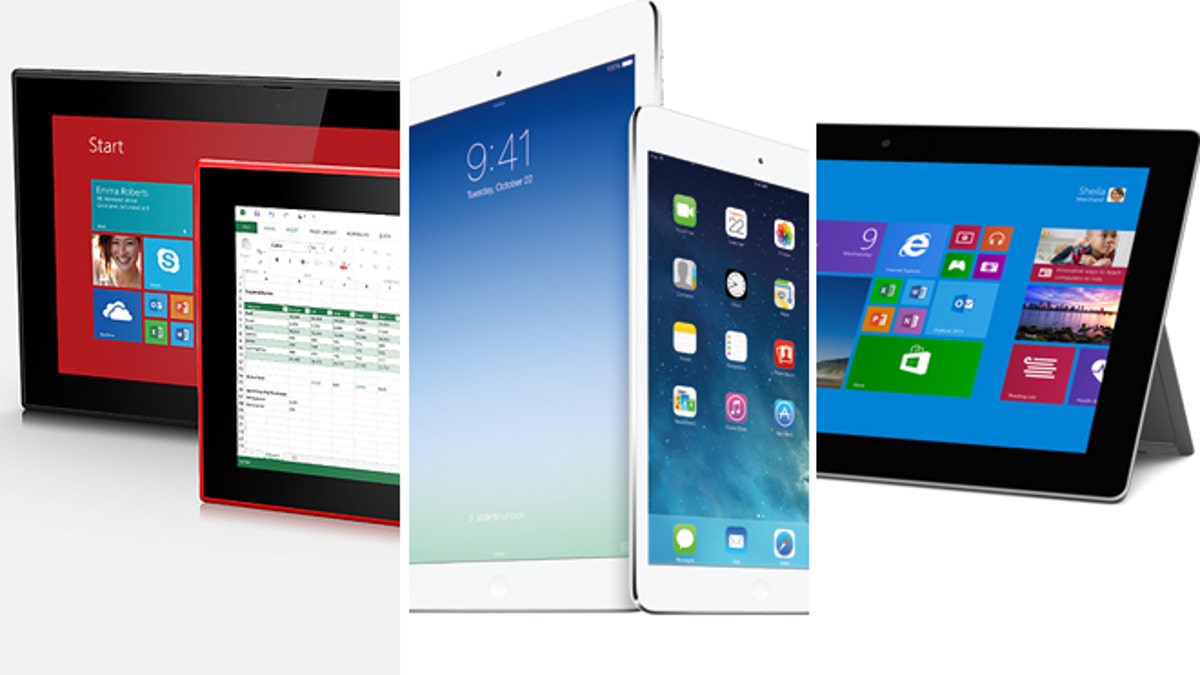
This week saw the introduction of new tablets from Nokia (left), Apple (center) and Microsoft (right), implying profound demand for the gizmos. But can we live by tablets only? (Nokia / Apple / Microsoft)
Can man (and woman) live by tablet alone?
Given this week's hoopla, you'd think we all had $500 burning a hole in our pockets waiting to buy a new tablet (even though, they're pretty much like the old tablets). Apple got most of the attention, but Microsoft officially launched new versions of its Surface tablets and former phone star Nokia launched its first Windows tablet.
If you told me a couple of years ago that millions of people would pony up $500, $700, even $800 for a small flat panel computing device that lets you surf the Net and take pictures, I would have said you were a clueless billionaire. The standing rule in consumer electronics for decades has been that you wouldn't -- couldn't -- have a successful product until you hit the magical $200 price point. Apple dramatically broke that rule with the iPad. The company has sold more than 170 million of the devices. The question is, can we live by iPad alone?
When Apple announced yet another iteration of its iPad this week, some wags noted that it was one of Apple's most boring media events ever. To be fair, nowadays people are disappointed unless Apple introduces a tricorder or time machine. The company also emphasized improvements in its laptops, but attention still revolved around the iPad Air, a thinner, faster tablet starting at $499 and going up to $799.
You'd think there was a bottomless pit of consumer desire for tablets as we chucked our desktops and laptops into the trash.
Meanwhile, Microsoft (quietly) launched its latest Surface Pro 2, starting at $899. And Nokia announced its first Windows tablet, the Lumina 2520, which will appear later this year starting at $499. With all these offerings and numerous others from Samsung and Google, anyone would think there was a bottomless pit of consumer desire for tablets as we chucked our desktops and laptops into the trash.
- Angry Birds meets Mario Kart – will it work?
- The Apple iPad Air: More speed, much less weight, few surprises
- Tablet smackdown: Apple, Microsoft unveil newest gadgets
- Hands-on with Apple’s new iPad Air
- Facebook flip-flops over videos of beheadings
- iOS 7.0.3 update offers new features, bug fixes, and end to motion sickness
- Nokia unveils first Windows tablet, new Windows Phones
Several trends have colluded to create the tablet craze. Pervasive connectivity to the Internet has meant incessant access to news and information, videos and movies, music and mashups, and it's swallowing up more and more of our time. A tablet is the ideal device for such digital distractions.
Laptops were already making inroads into living rooms. Mom keeping up with messages from her boss and juggling PTA duties; junior checking Facebook and Instagram while supposedly doing his homework. But clicking laptops were overkill for some of this multi-tasking, and they're intrusive. A tablet can be more easily shared and seems less intrusive (even if it really isn't) as far as the family dynamic goes.
Then there's the illusion of productivity. Tablets began appearing on airplanes almost immediately, first as status symbols, then because, let's face it, airlines have been squeezing out laptops. Shrinking seats and diminishing legroom have made it all but impossible to open up even the tiniest ultrabook and type. I can use a tablet no matter how far back the oaf in front of me pushes his seat back.
Lastly, the old '80s idea of a home PC was always misguided. Most people don't need one. We only do our taxes once a year, after all. And games are simpler to use on a tablet.
So is that it? Are desktops for the office only and the deluge of tablets is destined to wash over us drowning out all other computers?
The answer is probably not. Laptops and desktops are better at work, at focusing our attention on primarily solitary tasks where distractions are unwanted and multitasking is a dirty word. That end-of-semester thesis for the professor, the career-changing presentation, the precisely edited video -- all these tasks require you to lean in, hunker over a keyboard and block out your surroundings. By comparison, tablets are imminently interruptible.
On the other hand, inexpensive and quite capable tablets in the 7-inch ballpark are affordable and can supplement digital consumption at home without forcing people to choose between a laptop and a tablet. Consider Amazon's $139 Fire HD, Barnes & Noble's discounted $109 Nook HD, not to mention the $59 Nook Simple Touch e-reader.
Moreover, turning a tablet into a laptop isn't working either. At a very fundamental level -- Microsoft is learning the hard way -- productivity programs are not touch friendly or ready. Certainly there are some brilliant apps, including learning and reference programs for tablets. But just try working on a massive spreadsheet without a mouse and keyboard and a big monitor. A major rethinking of such software is in order and no one is close to making that happen yet.
We are certainly at a pivot point in computing. Every holiday shopper is going to have that driven home to them this year, overwhelmed by endless shelves of tablets and phablets. And many buyers will be faced with the question, can I make it with just a tablet?
Follow John R. Quain on Twitter @jqontech or find more tech coverage at J-Q.com.








































